
Economic History of Developing Regions
Scope & Guideline
Connecting Historical Perspectives to Modern Economic Challenges.
Introduction
Aims and Scopes
- Economic Development Trajectories:
The journal investigates the historical pathways of economic development in various regions, focusing on how historical events and policies have influenced current economic conditions. - Colonial and Postcolonial Studies:
A significant focus is on colonial and postcolonial impacts on economic structures, including land use, labor systems, and trade practices, and how these have evolved over time. - Social and Economic Inequality:
Research on income distribution, wealth inequality, and the socio-economic stratification in developing regions is a core area, examining historical contexts and their present implications. - Agriculture and Rural Development:
The journal frequently publishes studies on agricultural practices, rural development, and food security, particularly in the context of historical agricultural policies. - Gender and Economic History:
There is a notable emphasis on gender dynamics within economic history, including women's roles in labor markets, education, and socio-economic development. - Health and Economic Outcomes:
The intersection of health care provision, public health policies, and economic outcomes is explored, particularly in colonial and postcolonial contexts. - Migration and Labor Markets:
The journal addresses historical patterns of migration and their economic implications, focusing on labor markets and demographic changes.
Trending and Emerging
- Urbanization and Economic Growth:
There is an increasing focus on the dynamics of urbanization in developing regions, examining how historical urban growth patterns affect contemporary economic development. - Impact of Globalization:
Research on the historical impacts of globalization, particularly through trade routes and economic exchanges, has gained traction, emphasizing the interconnectedness of developing regions with global markets. - Health Outcomes and Economic Development:
Emerging studies are exploring the long-term impacts of health interventions and policies on economic development, particularly in postcolonial settings. - Inequality and Social Mobility:
There is a rising interest in examining the historical roots of economic inequality and its implications for social mobility, particularly in the context of education and labor markets. - Environmental History and Economic Practices:
An emerging theme is the intersection of environmental history with economic practices, focusing on how historical environmental policies and practices have shaped contemporary economic conditions.
Declining or Waning
- Historical Banking Systems:
Research on historical banking systems, while still relevant, has decreased, indicating a potential shift in focus towards broader economic themes rather than specific financial institutions. - Pre-Industrial Economic Systems:
The exploration of economic systems prior to industrialization appears to be waning, possibly due to a growing emphasis on modern development issues and their historical contexts. - Colonial Legacies in Economic Policy:
Discussions centered specifically on colonial legacies in economic policy have become less frequent, suggesting a broader analysis of economic history that is moving beyond colonial frameworks. - Traditional Agricultural Practices:
There is a noted decline in studies focusing solely on traditional agricultural practices without linking them to broader economic or social themes, reflecting a trend towards integrative approaches.
Similar Journals
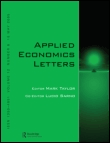
APPLIED ECONOMICS LETTERS
Connecting theory and practice in applied economics.Applied Economics Letters, published by Routledge Journals, Taylor & Francis Ltd, stands as a scholarly platform dedicated to the rapid dissemination of innovative research in the field of economics and econometrics. The journal, with ISSN 1350-4851 and E-ISSN 1466-4291, has been serving the academic community since 1994, and continues to thrive as it approaches its 30th anniversary in 2024. With a commendable position within the Q3 category in its field, it ranks #315 out of 716 journals in Scopus, signifying its impact within the percentile of 56th. Although it operates on a subscription basis, the journal's objective remains clear: to publish concise and substantive letters that contribute significantly to the discourse on applied economic issues, thereby providing valuable insights for researchers, professionals, and students alike. Applied Economics Letters is committed to addressing emerging trends and pressing economic challenges, making it an essential resource for anyone engaged in the dynamic world of economic inquiry.
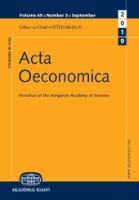
ACTA OECONOMICA
Exploring the depths of economics and econometrics.ACTA OECONOMICA is a distinguished academic journal published by AKADEMIAI KIADO ZRT, focusing on the fields of Economics and Econometrics. With an ISSN of 0001-6373 and an E-ISSN of 1588-2659, this journal has been a crucial platform for scholarly discourse since its inception, providing valuable insights to researchers, professionals, and students. Although it is categorized in the Q4 quartile for Economics and Econometrics as per the 2023 rankings, it serves as an important resource for emerging and established scholars alike, contributing to the ongoing dialogue within the economics community. The journal has a notable history of convergence from the years 1995 to 2000 and 2002 to 2024, reflecting its commitment to fostering academic excellence and promoting innovative research methodologies. While currently lacking open access options, ACTA OECONOMICA offers a wealth of research articles and discussions, making it an essential reference for those seeking to deepen their understanding of economic theories and applications.

Economics of Transition and Institutional Change
Exploring the nexus of economics and institutional evolution.Economics of Transition and Institutional Change is a dynamic academic journal published by WILEY, dedicated to exploring the intricate relationship between economic transitions and institutional modifications across diverse global contexts. Established in 2019, the journal aims to illuminate the mechanisms through which institutional change influences economic performance, particularly in transitional economies. With its ISSN 2577-6975 and E-ISSN 2577-6983, the journal provides a platform for researchers and economists to disseminate high-quality, peer-reviewed research that reflects contemporary issues in the field. Given its classification in the Q3 and Q2 quartiles for 2023 in both Economics and Econometrics, and broader categories involving Finance, it occupies a vital role within its academic niche, ensuring your work gains the attention it deserves. The journal offers open access options, making valuable research freely available to a wider audience, thereby enhancing its impact. Located in Hoboken, New Jersey, Economics of Transition and Institutional Change invites contributions that investigate theoretical and practical perspectives, ensuring a rich dialogue among scholars, practitioners, and policymakers.
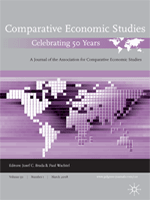
Comparative Economic Studies
Advancing the Frontiers of Economic InsightComparative Economic Studies is a prominent academic journal dedicated to the field of economics, published by Palgrave Macmillan Ltd. Now in its converged years from 1996 to 2024, this journal provides a robust platform for innovative research and critical analysis within the economics and econometrics arenas. With an ISSN of 0888-7233 and an E-ISSN of 1478-3320, it has established itself as a vital resource for scholars and practitioners interested in comparative economic analysis, policy evaluation, and theoretical advancements. Recognized for its quality, the journal is classified in the Q3 category in 2023, reflecting its solid standing within the field, with a Scopus rank of 390 out of 716 journals in economics and econometrics. Although it currently does not offer open-access options, the journal is committed to disseminating significant findings that influence policy and scholarship globally. Its well-curated articles play an essential role in shaping contemporary economic discourse, making it an indispensable resource for researchers, professionals, and students alike.

Revista Uruguaya de Historia Economica
Connecting History and Economics for a Deeper UnderstandingRevista Uruguaya de Historia Economica is a premier academic journal dedicated to exploring the multifaceted aspects of economic history in Uruguay and Latin America. Published by the ASOC URUGUAYA HISTORIA ECONOMICA, this journal aims to serve as a vital platform for researchers, scholars, and practitioners seeking to understand the evolution of economic policies, practices, and theories within a historical context. With an ISSN of 1688-8561, the journal highlights rigorously peer-reviewed articles that enhance the discourse in economic history and related fields. Although it does not offer open access, the Revista Uruguaya de Historia Economica is pivotal for those aiming to broaden their knowledge and scholarly engagement in Latin American economies. With its profound commitment to advancing economic historical research, the journal positions itself as an essential resource for academics and professionals alike, stimulating both local and international discourse.
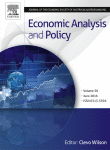
Economic Analysis and Policy
Driving Innovation in Economic Analysis and Policy SolutionsEconomic Analysis and Policy is an esteemed academic journal published by ELSEVIER, dedicated to advancing the field of economics and econometrics since its inception in 1970. Based in the Netherlands, this journal plays a pivotal role in disseminating high-quality research that addresses contemporary economic issues and policy challenges. With an impressive Q1 ranking in both the Economics and Econometrics categories, and recognition in the top 91st percentile of Scopus rankings, it is a leading platform for scholars, professionals, and students seeking to contribute to and engage with the evolution of economic thought. The journal does not currently operate on an open access model, allowing it to maintain rigorous peer-review standards that ensure the integrity and impact of published research. As a vital resource for anyone interested in the intersection of theory and policy in economics, Economic Analysis and Policy fosters a community committed to rigorous analysis and innovative solutions in the economic domain.
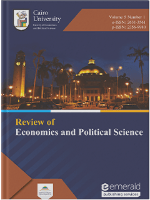
Review of Economics and Political Science
Advancing interdisciplinary dialogue for a better tomorrow.Review of Economics and Political Science, an esteemed publication by EMERALD GROUP PUBLISHING LTD, stands at the forefront of interdisciplinary research, exploring the intricate relationships between economics, political science, and societal dynamics. Since its transition to an Open Access format in 2018, the journal has provided global accessibility to cutting-edge research, fostering a rich dialogue among scholars and practitioners in the fields of Applied Mathematics, Econometrics, and Political Science. With a commendable Q2 ranking in multiple categories including Economics and Political Science, the journal offers a robust platform for high-impact studies that drive innovation and policy development. Located in the United Kingdom, it caters to an international audience and actively contributes to the academic discourse, as evidenced by its solid performance in Scopus rankings. Researchers, professionals, and students alike will find invaluable insights within its pages, making it a vital resource for understanding contemporary economic and political challenges.
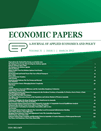
Economic Papers
Elevating Understanding of Economic Dynamics.Economic Papers is a prestigious journal published by WILEY, recognized for its contributions to the fields of economics, econometrics, and finance since its inception in 1982. With an impressive impact factor reflecting its scholarly influence, this journal is ranked in the Q2 category in the Economics, Econometrics, and Finance sector, placing it among the top 30% of journals in the field. The journal aims to disseminate high-quality research that addresses contemporary economic challenges, thereby advancing both theoretical understanding and practical applications. While currently not available as open access, Economic Papers provides vital insights for researchers, professionals, and students striving to deepen their comprehension of economic dynamics and contribute to sound policy-making. Scholars are encouraged to submit their work to engage with a robust academic community and impact the discourse in economic research.

Economia-Journal of the Latin American and Caribbean Economic Association
Empowering Economic Insights Across Latin America and the CaribbeanEconomia - Journal of the Latin American and Caribbean Economic Association, published by LSE Press, serves as a vital platform for the dissemination of economic research pertinent to the Latin American and Caribbean regions. Since its inception in 1977, this Open Access journal has embraced an inclusive approach, ensuring that valuable insights are readily accessible to a global audience. With an ISSN of 1533-6239, Economia aims to highlight issues related to economic development, policy analysis, and international economics, making significant contributions to the fields of economics, political science, and international relations. It currently ranks in the Q4 category across several related fields, reflecting its emerging status in the academic discourse. The journal's commitment to fostering interdisciplinary dialogue is evident through its annual publications, making it an essential resource for researchers, professionals, and students eager to engage with contemporary economic challenges and innovations in the region.
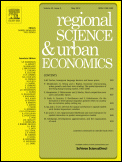
REGIONAL SCIENCE AND URBAN ECONOMICS
Driving innovation in understanding urban challenges.Regional Science and Urban Economics, published by Elsevier, is a premier academic journal dedicated to advancing the understanding of spatial dynamics and urbanization. With an ISSN of 0166-0462 and E-ISSN 1879-2308, this journal has established itself as a vital resource for researchers and practitioners in economics and urban studies, boasting a remarkable impact factor and ranking in the Q1 category for both fields. Since its inception in 1975, the journal has provided a platform for high-quality research that examines both theoretical and empirical aspects of regional science and urban economics. With a Scopus rank of 47th in Urban Studies and 157th in Economics, it ensures that the latest findings reach a wide audience. Researchers interested in exploring spatial economics and urbanization trends will find this journal indispensable for staying at the forefront of their fields, facilitating collaboration and innovation in addressing contemporary urban challenges.